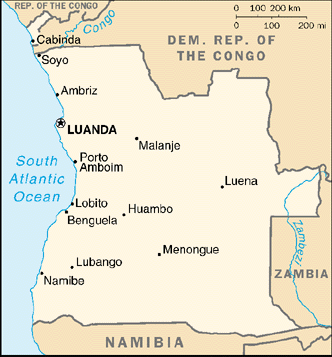

Status Quo Side: Angolan government
Non-Status Quo Side: UNITA
Region: Africa
Conflict Type: External Intervention
Issues in Dispute: Governance, Resources, Strategic
Maps: [UTexas Angola maps]
Portugal's 400 year rule ended in 1974 [see ANG]. The opposition had comprised 3 tribally and ideologically distinct groups: the Kimbundu-centered Popular Movement for the Liberation of Angola (MPLA), founded in 1956 by exiled intellectuals who soon became Marxist; the non-Marxist Kongo-centered National Front for the Liberation of Angola (FLNA) with support from Zaire; and the Ovimbundu-centered (Angola's largest tribe) National Union for the Total Independence of Angola (UNITA), Jonas Savimbi's 1966 offshoot of FLNA. In the Portuguese-brokered Alvor Agreement of January 15 1975, the 3 agreed to an all-Angolan army and an interim coalition government prior to elections for a constituent assembly.
Each party maneuvered for sole control, their armies poised to attack. The coalition government took office on 31 January 1975.
The coalition collapsed, leaving Luanda under MPLA control. In the fall, with aid from Zaire to FLNA and South Africa to UNITA, these forces attacked the MPLA, which prevailed with Soviet aid and Cuban troops. FLNA ceased operations and UNITA lost Zairian and Tanzanian support. UNITA's US aid ceased in December. A costly stalemate ensued until 1988 despite S. African and US support (renewed under President Reagan) to UNITA. With improved US-Soviet relations in the late 1980's, multilateral efforts achieved an August 5 1988 agreement between South Africa, Cuba and Angola (MPLA) ending S. African and Cuban intervention (supplementing UN resolution 435 on Namibia). The level of conflict lessened.
Savimbi and Angolan President Jose Eduardo dos Santos signed a cease-fire on May 311991 providing for elections monitored by 600 UN peacekeepers. UNITA-US relations soured amid charges of human rights abuses and counter charges of a CIA plot. Elections on September 29 and 30 were upheld as fair by international monitors, with dos Santos the narrow winner. Savimbi's protests were denied by UN monitors, who sought a runoff election. Heavy street fighting continued.
Renewed, prolonged violence devastated the country. Despite a UNITA declared formal ceasefire in November 1993 and UN mediation begun in Zambia, destruction continued. The Lusaka agreement signed by representatives of both sides called for a cease-fire, rebel disarmament, run-off elections and creation of an inclusive national army. As minor skirmishes continued, the UNSC in February 1995 unanimously approved 7,000 peacekeepers to monitor the accord. The first contingent arrived in late May after Savimbi formally acknowledged dos Santos as the undisputed President. The peace process remained extremely fragile with cease-fire violations on both sides, and the demobilization of UNITA forces barely begun. On February 8, 1996, the UNSC extended its largest peacekeeping mission for three months. In December, 1996 the sides agreed to form a government of national reconciliation, and in April, 1997 a unified government was sworn in, But Savimbi, who controlled vast diamond resources, once again kept Africa's longest running war going by remobilizing UNITA forces. A disillusioned US began supplying the Angolan army, and in August 1997 the UNSC unanimously imposed air and travel restrictions on UNITA and suspended the withdrawal of peacekeepers.
The cease-fire began breaking down as government forces retook rebel areas and local police brutalized UNITA supporters. UN special envoy Alioune Blondin Beye was killed in a place crash and was not replaced for months. Government forces became diverted by interventions in the Congo civil war, while rebel forces retook more than half the countryside, displacing an estimated 200,000 people. Despite huge oil revenues, the government did little to relieve domestic misery, while UNITA continued to acquire huge revenues by diamond smuggling. In January, 1999, the government abandoned the Lusaka Agreement, which UN Secretary General Kofi Annan reported had no hope of implementation. On February 26 the Security Council voted to withdraw the peacekeeping mission, which had already cost $4 billion.